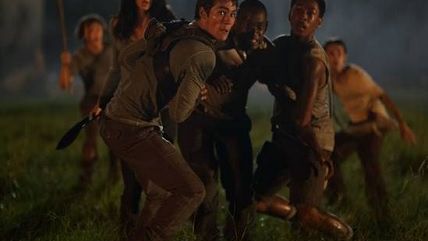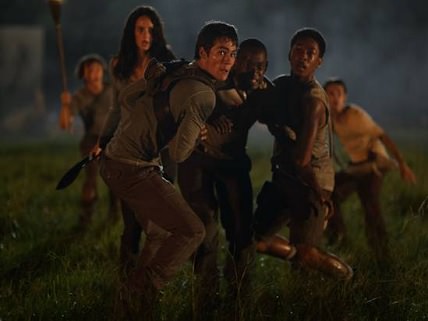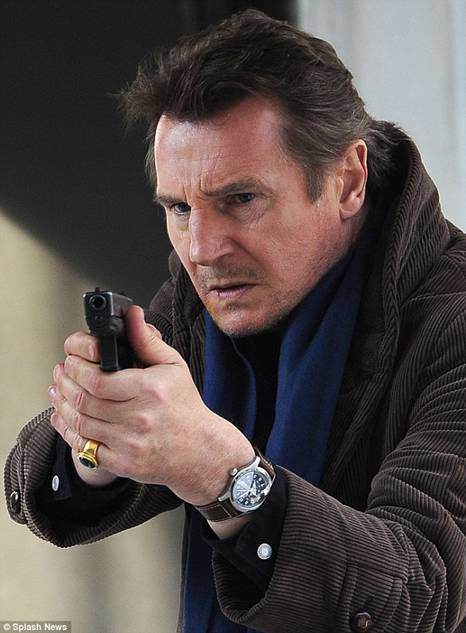The Maze Runner and A Walk Among the Tombstones
More teen dystopia, and some middling Liam Neeson crime action.


Have we reached dystopia overload yet? In a year that's already provided us with Divergent and The Giver, now comes The Maze Runner, similarly drawn from the first in a series of best-selling young adult sci-fi novels and once again featuring a group of attractive youths trapped in an enclosed society, where they're being sorely tested for obscure reasons. The story here is kind of interesting (and promises to become more so in the already green-lit sequel), and the movie's target audience may well be drawn by the presence of Teen Wolf star Dylan O'Brien and Game of Thrones' Thomas Brodie-Sangster. But the movie isn't much to look at—it has none of the big-budget gloss of other films in this blockbuster genre—and it's a little slow in places, too. Non-teen viewers may find enthusiasm hard to marshal.
The setting is the Glade, a big field fringed with forest and surrounded by towering concrete walls. Inside lives a tribe of boys with no memory of who they are and no idea why they've been placed here. Each of them has arrived, over the course of three years, via a subterranean elevator that also delivers monthly supplies for farming and hut-building and hammock-hanging. Outside the walls, accessible through enormous gates, is an elaborate maze, which has defeated the boys' every effort to escape. The gates close at night to keep out the nocturnal Grievers—gigantic, bio-mechanical spiders with familiar fang-filled maws and fearsome stingers. Such is the setup.
The picture begins with the arrival of Thomas (O'Brien), who quickly makes the acquaintance of the other main characters, among them the community's friendly leader Alby (Aml Ameen), the hostile Gally (Will Poulter), the clever Newt (Brodie-Sangster), the very buff Minho (Ki Hong Lee), and the lovably chubby Chuck (Blake Cooper). There are some predictable getting-to-know-you scenes, and then an appearance by a crazed kid named Ben (Chris Sheffield), who was trapped outside the wall, got stung by a Griever, and now "belongs to the Maze," as someone glumly puts it.
Before long a girl arrives. Her name is Teresa (Kaya Scodelario), and she comes bearing an odd note from whoever's running this whole deal. The note says: "She's the last one ever." Even more oddly, she recognizes Thomas from…well, who knows where. There are subsequent forays into the Maze, scary Griever attacks, and, at the end, a glimpse of the Creators—the people behind the kids' plight. They're on hand to introduce a fadeout teasing the next film in this prospective franchise. Have we been here before or what?
The movie wages a losing battle against its low-fi visuals. No amount of tilt-up camera angles can make the big gray walls very interesting, and even the rampaging Grievers lack pizzazz—they immediately recall better digital confections in the Harry Potter films, and we've seen their toothy mugs before, most recently—mere months ago, in fact—in the Tom Cruise alien-invader flick Edge of Tomorrow. The actors are a spirited bunch, for the most part. O'Brien can muster a dark intensity beyond the call of simple hunkdom; but Scodelario, marooned in a role that's practically vestigial, brings to mind the vacant-eyed Kristen Stewart of the Twilight films. Maybe she'll be given more to do in the next installment (The Scorch Trials, it's called), which could in turn be a more stylishly made picture. As you know, we'll find out soon enough.
A Walk Among the Tombstones

Liam Neeson's trademark troubled butt-kicker returns in A Walk Among the Tombstones. Not kicking quite as much butt as he does in the Taken movies this time, and minus the booze-gulping habit he brought to the shakes-on-a-plane feature Non-Stop earlier this year, but still bad-ass, although in a wearier, more contemplative, more sad-sack sort of way.
The movie is based on one of Lawrence Block's many crime novels about the ex-NYPD detective Matthew Scudder (Neeson's character), who works as an "unlicensed" private investigator of the sort who does "favors for friends." The friend here is an amiable junkie named Peter (Eric Nelsen), who recruits Scudder to assist his drug-trafficking brother Kenny (Downton Abbey vet Dan Stevens), whose wife has been kidnapped and—even though Kenny ponied up the demanded ransom—murdered in a most gruesome way.
Scudder gets right to work. We see him at a library poring over microfiche newspaper files in which he discovers earlier murders of young women that suggest a similar M.O. In the course of these researches, he strikes up a conversation with a spunky street kid called T.J. (Brian "Astro" Bradley), who soon becomes his spunky assistant. Looking into one of the previous killings, Scudder encounters a creepy cemetery groundskeeper named Jonas (Ólafur Darri Ólafsson), who proves reluctantly helpful. Jonas is a weirdo ("You're a weirdo, Jonas," Scudder tells him), but he's personally acquainted with the killers in this case. "They're not human!" he explains.
There are two of them, it turns out, and we see them prowling around town in their white kidnapping van, faces illuminated, at first, only by faint dashboard glow. They're stalking their next victim, the very young daughter of a cocaine kingpin named Yuri (Sebastian Roché). By the time they have her in their clutches, however, Scudder knows their names and is hot on their trail.
The movie wants to be a pervy shocker in the manner of David Fincher or Jonathan Demme (there are scenes inside the killers' house of torment that lightly summon the spirit of Buffalo Bill). But director Scott Frank (The Lookout) is not a blood-feast kind of guy. There are a few icky moments—a severed finger here, an off-camera breast amputation there (this is not a movie in which you'd want to be a woman)—but they lack true sicko style. And the killers (David Harbour and Adam David Thompson) are all too human—they have no psycho flair, and we never get a fix on their motivation. Do they just really hate drug dealers? (In which case, why not kill them, instead of their wives and daughters?) Or is their main problem the fact that they're gay? (We see one of them baking biscuits for breakfast.) Ridiculously, the latter possibility seems to be the one that's being proposed.
Throughout the film, there are time-outs for the alcoholic Scudder to stop by AA meetings (the organization's 12-step guidelines are recited in voice-over during a climactic face-off). And there's a pointless appearance by a group of hostile DEA agents, and a completely out-of-the-blue insertion of Donovan's "Atlantis," which serves only to remind us how much better-used the song was in Goodfellas.
The movie has some colorful performances, especially by Ólafsson, who's wonderfully schlubby. And Neeson, of course, holds our attention throughout with his familiar sonorous presence. But he seems tired here, as if wondering why he's going through the motions in this sort of undistinguished genre material yet again. It's too bad there are so many more Scudder novels where this picture came from. It'd be sad to see such a fine actor wasting more time attempting to distill another franchise out of them.


Show Comments (9)